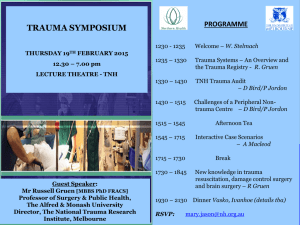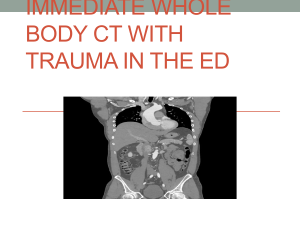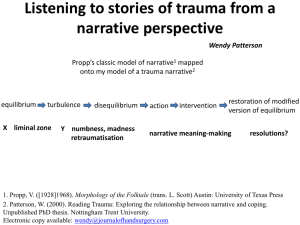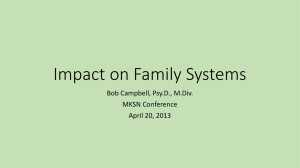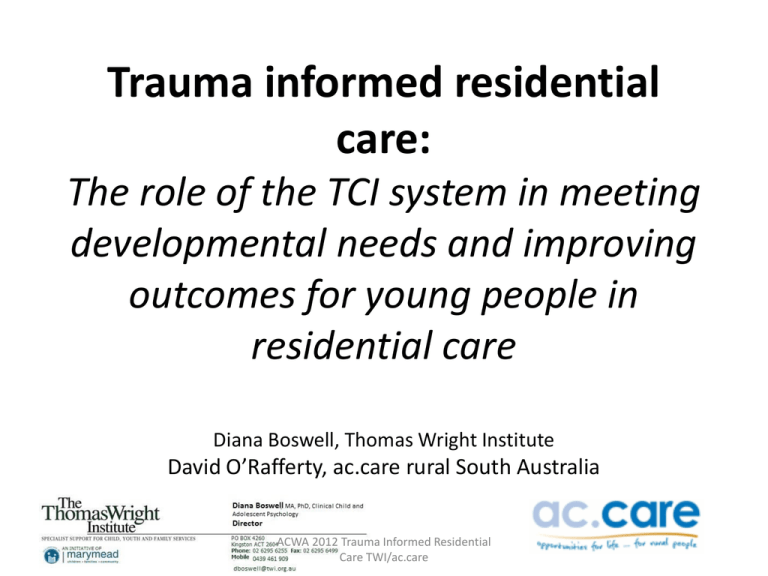
Trauma informed residential
care:
The role of the TCI system in meeting
developmental needs and improving
outcomes for young people in
residential care
Diana Boswell, Thomas Wright Institute
David O’Rafferty, ac.care rural South Australia
ACWA 2012 Trauma Informed Residential
Care TWI/ac.care
The question is
not “What is
wrong with
you?” …but
“What has
happened to
you?”
Sandra Bloom
ACWA 2012 Trauma Informed Residential
Care TWI/ac.care
ACWA 2012 TRAUMA INFORMED RESIDENTIAL CARE TWI/AC.CARE
ACWA 2012 Trauma Informed Residential
Care TWI/ac.care
ACWA 2012 Trauma Informed Residential
Care TWI/ac.care
ACWA 2012 Trauma Informed Residential
Care TWI/ac.care
ACWA 2012 Trauma Informed Residential
Care TWI/ac.care
ACWA 2012 TRAUMA INFORMED RESIDENTIAL CARE TWI/AC.CARE
racism
ACWA 2012 TRAUMA INFORMED RESIDENTIAL CARE TWI/AC.CARE
ACWA 2012 TRAUMA INFORMED RESIDENTIAL CARE TWI/AC.CARE
ACWA 2012 TRAUMA INFORMED RESIDENTIAL CARE TWI/AC.CARE
ACWA 2012 TRAUMA INFORMED RESIDENTIAL CARE TWI/AC.CARE
GRAND THEFT AUTO
– the most popular video game
ever – moves pornography and
violence into the mainstream.
Players gain strength points by
having sex with prostitutes, and
then regain money points by
killing them.
Approximately 75% of 12- to16-year old boys have played
the game.
Olfman, 2008
ACWA 2012 Trauma Informed Residential
Care TWI/ac.care
PREMATURE SEXUALISATION
ACWA 2012 Trauma Informed Residential
Care TWI/ac.care
ACWA 2012 TRAUMA INFORMED RESIDENTIAL CARE TWI/AC.CARE
ACWA 2012 TRAUMA INFORMED RESIDENTIAL CARE TWI/AC.CARE
Young people in pain
… grief at losses and
abandonment; persistent
anxiety about themselves and
their situation; fear of or even
terror about a disintegrating
present and a hopeless future;
depression and dispiritedness
at a lack of meaning or sense
of purpose in their lives... or a
state of numbness and
withdrawal
ACWA 2012 Trauma Informed Residential
Care TWI/ac.care
(Anglin, 2002, p. 109-110)
IMPACT ON GROWTH AND
DEVELOPMENT
• Chronic state of high stress
• Interpreting neutral cues as threat
• Explosive patterns of fight/flight
behaviour
• Extreme patterns of freeze
behaviour
• Limited resilience
• Adult wary in relationships
• Deficits in thinking skills
ACWA 2012 Trauma Informed Residential
Care TWI/ac.care
Relationships are the agents of
change
Yet one recurring observation about
resilience and coping with trauma is the
power of healthy relationships to protect
from and heal following stress, distress
and trauma.
This relational modulation of stress is
mediated by two interrelated and broadly
distributed systems in the human brain:
the stress response systems and neural
networks involved in boding, attachment,
social communication and affiliation
ACWA 2012 Trauma Informed Residential
Care TWI/ac.care
Bruce Perry, 2009
The three pillars of intervention
in cases of complex trauma
“Clinicians have learned to focus on
issues of:
1. safety,
2. affect regulation, coping and selfmanagement skills, as well as on the
3. therapeutic relationship itself...”
van der Kolk & Courtois, 2005
ACWA 2012 Trauma Informed Residential
Care TWI/ac.care
The primary impact
of traumatic stress is
a breakdown in the
capacity to regulate
internal states like
fear, anger, and
sexual impulses.
van der Kolk (2005)
ACWA 2012 Trauma Informed Residential
Care TWI/ac.care
Kids in stress create in adults their
feelings and, if not trained, the
adults will mirror their behaviour
(Long
& Fecser,
2000)
ACWA 2012
Trauma
Informed Residential
Care TWI/ac.care
ACWA 2012 Trauma Informed Residential
Care TWI/ac.care
Co-regulation
Coercive regulation
Awareness of own feelings
No awareness of own feelings
Focus on child’s feelings
Goal: helping child to calm
Focus on child’s behaviours
Goal: stopping ‘bad’ behaviour
Soothing , assertive tone
Absorbing child’s invective
Meeting immediate needs
Loud, aggressive tone
Retaliating to child’s invective
Ignoring child’s needs
ACWA 2012 Trauma Informed Residential
Care TWI/ac.care
Edition 6
Residential Child Care Project
Cornell University 2009
ACWA 2012 Trauma Informed Residential
Care TWI/ac.care
THERAPEUTIC CRISIS INTERVENTION
ACWA 2012 Trauma Informed Residential
Care TWI/ac.care
THE TRIUNE BRAIN
“We want to raise children
Survival Brain
whose
Emotional Brain
reasoning brain
Logical Brain
can triumph
over the
impulsive brain”
THE SURVIVAL BRAIN (brain stem) is first to develop and handles automatic biological
functions like heart beat and respiration. Also called the reptilian brain, it reacts to
threat or danger signals from the amygdala, triggering fight or flight reactions.
Traumatic events can engrave strong descending pathways from the emotional brain to
the survival brain. The more these circuits are activated, the stronger they become
(cells that fire together wire together). A hypervigilant brain is quick to react and
kindles survival reactions in stressful situations.
Phyllis
Stein &
THE EMOTIONAL BRAIN (limbic brain) motivates behavior in all mammals. The
amygdala (almond) scans for danger or opportunity, instantly triggering emotions,
Joshua
Kendall
particularly
fear and anger, and warns the survival and logical brains. The amygdala
reads emotional cues in tone of voice, facial expressions, eye contact, and gestures.
Emotionally charged memories are also stored in the hippocampus and elsewhere.
Emotions shape logic by many ascending pathways. Humans are highly social and
when not under threat, the primary (default) emotion is social interest.
THE LOGICAL BRAIN (prefrontal cortex) is the “executive” in charge of language,
reasoning, regulating emotions, tapping memory, predicting consequences, problem
solving, and
coping.
Brain scans
show
this area is blank at birth and is wired
ACWA
2012 Trauma
Informed
Residential
(myelinated) by life Care
experiences.
The
left
brain specializes in logical thinking and
TWI/ac.care
positive emotions while the right brain handles nonverbal information and monitors
Children must learn to
know what they feel, put
those feelings into words,
or find some other
symbolic expression …
otherwise they simply
have no story.
Bessel van der Kolk
(van der Kolk, 2005)
ACWA 2012 Trauma Informed Residential
Care TWI/ac.care
SUPPORT: environmentally and emotionally to reduce stress
and risk
TEACH: children better ways to cope with stress
THERAPEUTIC CRISIS INTERVENTION
ACWA 2012 Trauma Informed Residential
Care TWI/ac.care
THERAPEUTIC CRISIS INTERVENTION
ACWA 2012 Trauma Informed Residential
Care TWI/ac.care
Ac.care Residential 24 / 7 Emergency
Accommodation
ACWA 2012 Trauma Informed Residential
Care TWI/ac.care
Ac.care Residential 24 / 7 emergency
houses
•
•
•
•
•
•
•
•
•
•
•
•
•
Took over the program in 2010 September
3 houses in rural areas in South Australia
4 beds per house
Target group 0 to 18
Double staff each shift
Up to 3 staff during the weekdays day shift
Running over budget
P&P from FSA and some from another agency
Initial training when first established, little on going training
Ad hoc staff meetings
High staff turn over
High staff injury rate
Excessive property damage
ACWA 2012 Trauma Informed Residential
Care TWI/ac.care
• Incidents 2009 – 2010
1: Injury to Staff
2: Injury to Youth
3: Staff alleged assault by youth
4: Youth Alleged assault by youth
5: Restraint or Physically Controlled
6: Major Disturbance
7: Property Damage
8: Self Harm
9: Drugs and or Alcohol
10: Absconded
11: Other
30
25
20
15
10
5
0
1
106
2009 to 2010
7
2
11
3
4
7
8
5
6
9
ACWA 2012 Trauma Informed Residential
Care TWI/ac.care
10
7
8
11
9
8
10
0
11
10
25
Therapeutic Strength Based Care
• By January 2011
• Name changed to TSBC
• Staff position name changed from Support Workers /
Carers to Therapeutic Support workers, now a
professional role.
• New P&P specifically for TSBC
• Fortnightly structured staff meeting
• Rosters rewritten to ensure work life balance, single
staff passive night shift, House Supervisor to work on
the floor from 11am to 2pm each day when possible
• Engaged Clinical Psychologist to assist staff with
reflective practice and help develop strategies for
dealing with underlying trauma based behaviour and to
2012 Trauma Informed Residential
provide clinicalACWA
supervision
Care TWI/ac.care
Continue
• Commenced 6 weekly case conferences, by inviting
stakeholders, setting agenda, chairing meeting and completing
minutes
• Monthly training day with all staff, delivered by C P on topics
such as
• Brain development and trauma
• Implicit and explicit behaviour
• Pervasive shame
• Other training such as case noting
• Houses now operating from a therapeutic framework
• Program returning a surplus, which is fed back into the houses
• Practice influenced by research and looking at best practice by
people such as Dr Bruce Perry, The ChildTrauma Academy;
Martha Holden of Cornell University; Berry Street and Take Two
ACWA 2012 Trauma Informed Residential
Care TWI/ac.care
Ac.care Residential 24 / 7 Emergency
Accommodation
ACWA 2012 Trauma Informed Residential
Care TWI/ac.care
Incidents 2010 - 2011
1: Injury to Staff
2: Injury to Youth
3: Staff alleged assault by youth
4: Youth Alleged assault by youth
5: Restraint or Physically Controlled
6: Major Disturbance
7: Property Damage
8: Self Harm
9: Drugs and or Alcohol
10: Absconded
11: Other
30
25
20
15
10
5
0
1
106
41
2009 to 2010
2010 to 2011
7
3
2
11
1
3
4
7
1
8
2
5
6
9
0
10
7
ACWA 2012 Trauma Informed Residential
Care TWI/ac.care
7
8
11
2
9
8
0
10
0
2
11
10
3
25
20
TCI Implementation
•
•
•
•
September 2011
Staff trained in TCI by Dec 2011
Before TCI, something missing to tie it all together
TCI creates a framework in which all staff can operate
from to ensure consistence of care and responses.
• TCI is an intensive 4 day training program
• We also conduct a 4 hour review sessions every 6
months
ACWA 2012 Trauma Informed Residential
Care TWI/ac.care
1: Injury to Staff
2: Injury to Youth
3: Staff alleged assault by youth
4: Youth Alleged assault by youth
5: Restraint or Physically Controlled
6: Major Disturbance
7: Property Damage
8: Self Harm
9: Drugs and or Alcohol
10: Absconded
11: Other
30
25
20
15
10
5
0
1
106 Series 1 2009 to 2010
41 Series 2 2010 to 2011
46 Series 3 2011 to 2012
7
3
0
1
2
11
1
8
2
3
4
7
1
2
3
8
2
8
4
5
6
9
0
0
5
10
7
5
6
ACWA 2012 Trauma Informed Residential
Care TWI/ac.care
7
8
11
2
6
7
9
8
0
0
8
10
0
2
0
9
11
10
3
2
10
25
20
15
11
Summary
• Staff are operating in a professional therapeutic role
• Staff now have an understanding that underlying
trauma affects behaviour
• Staff now respond to the trauma in an informed way
which aims to increase positive outcomes for client
and staff
• Staff use reflective practice at staff meetings to
review interactions with clients
• Staff have formal supervision 6 weekly
• Staff are more engaged and empowered in their role
• A reduction in sick days and staff turnover
• Staff operating as a team with a team approach
• Houses now operate
as therapeutic homes
ACWA 2012 Trauma Informed Residential
Care TWI/ac.care
ACWA 2012 Trauma Informed Residential
Care TWI/ac.care
ACWA 2012 Trauma Informed Residential
Care TWI/ac.care
ACWA 2012 Trauma Informed Residential
Care TWI/ac.care


